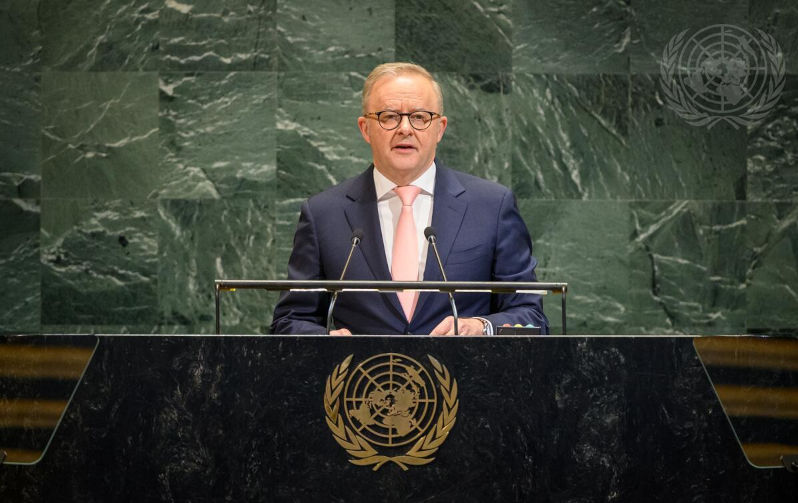Legitimacy or leverage? The battle over what recognition really means
September 29, 2025
When Britain, Canada, Australia, France and others moved in quick succession to recognise the State of Palestine, observers described it as a “cascade” – a diplomatic avalanche that broke a Western taboo and forced an international conversation about statehood, occupation and impunity.
The cascade is unprecedented, a political shift that changes the terms of debate, but without consequences; it risks stalling in symbolism. Recognition without follow-through risks becoming a grammar exercise in legitimacy rather than a lever for justice.
UK Prime Minister, Keir Starmer framed Britain’s recognition as a way “to revive hopes for peace and a two-state solution". But those hopeful words are not matched by binding actions that alter realities on the ground: occupation, settlements, violence and blockade. Similarly, Australia’s Palestine Advocacy Network dismissed Canberra’s move as “a political fig leaf,” pointing out that recognition was not coupled with restrictions on arms exports or trade ties with Israel.
This underscores the central question: what is recognition allowed to do? Remain symbolic, or be harnessed into an enforceable architecture that disrupts the political and legal feedback loops protecting impunity?
Symbolism without consequence
Recognition carries weight. It confers legitimacy, opens legal avenues and sends a signal that the world will not endlessly defer Palestinian rights. But weight is not the same as leverage. Unless recognition is tied to concrete measures — sanctions, embargoes, legal co-operation — it remains hollow. Political scientists such as Nathan Thrall have long warned that “statements without consequences reinforce the very impunity they seek to challenge”.
History illustrates this. During the apartheid era in South Africa, recognition of injustice mattered – but it was boycotts, divestment and sanctions that eventually shifted the cost calculus. In the Balkans, recognition was accompanied by international mandates, tribunals and peacekeeping that forced actors to reckon with accountability. Recognition without consequence risks enabling political theatre while leaving the drivers of dispossession intact.
Two flaws in the recognition cascade
Two flaws stand out in the current wave. First, recognition has been decoupled from enforcement. No state has yet spelled out what recognition requires in practice: halting settlement expansion, opening humanitarian access or respecting ceasefires. Second, the cascade is fragile. Israel has denounced the recognitions as “political theatre” and “rewarding terrorism”, while allies may threaten economic or diplomatic retaliation. The danger is that governments retreat into symbolism precisely when they should push forward.
The role of geopolitical asymmetry
American vetoes and rhetorical cover for Israel in multilateral forums have insulated it from collective accountability. As a result, recognition by other states can be seen as an attempt to redress that imbalance and create alternative centres of diplomatic gravity. Yet unless these states co-ordinate concrete measures, the isolation remains partial and reversible.
Economic incentives also blunt accountability. Arms sales, energy partnerships and strategic alliances create constituencies that profit from the status quo. Recognition becomes costly in rhetoric, but not in material terms. Palestinian scholar Noura Erakat reminds us that “international law is not self-executing; it requires political will to be enforced”.
Singapore signals to impose targeted sanctions on Israeli settler leaders while signalling openness to recognising Palestine under conditions. Pairing recognition with tangible consequences illustrates what principled policy can look like. It also underlines a broader truth: recognition can be more than ceremony if states are willing to take risks.
From cascade to architecture
If recognition is the political spark, how do we fashion the match? Six levers stand out:
- Recognition-with-conditionality treaties – States should adopt treaties specifying measurable benchmarks (ceasefire, humanitarian access, suspension of settlements) with automatic consequences for non-compliance (arms embargoes, sanctions, diplomatic downgrades).
- Legal co-operation – Recognition should be tied to commitments to strengthen the International Criminal Court’s investigatory capacity and to enforce sanctions or asset freezes.
- Financial chokepoints – Defence and dual-use exports must be tied to compliance benchmarks, with sanctions against complicit firms.
- Conditional reconstruction – Aid to Gaza must be channelled through transparent, audited frameworks with civil society participation to prevent diversion.
- Transparency – Recognising states should publish compliance reports tied to benchmarks, transforming soft pressure into reputational accountability.
- Coalition enforcement – A multilateral “enforcement compact” should escalate measures collectively, preventing states from retreating into symbolism.
The stakes of inaction
Language matters. Analysts repeatedly invoke frames such as “the feedback loop of impunity” and “Gaza is burning” to press urgency. If impunity is a loop, interventions must be systemic; if Gaza is burning, incrementalism is politically and morally insufficient.
Recognition without consequence legitimises paralysis. Israeli leaders, dismissing recognitions as “political theatre”, are emboldened by the lack of material follow-up. As Gaza’s devastation deepens, international norms erode when law is applied selectively.
The cascade of recognitions is not an end, but an opening move. Symbolism alone will collapse into silence. But recognition tied to sanctions, embargoes, legal co-operation and financial scrutiny can bend incentives, constrict impunity and restore — incrementally — the integrity of international law.
The choice is stark: will recognition ripple into justice, or rewind into empty ceremony? For Palestinians, and for the credibility of the international system, it must be the former.
The views expressed in this article may or may not reflect those of Pearls and Irritations.

